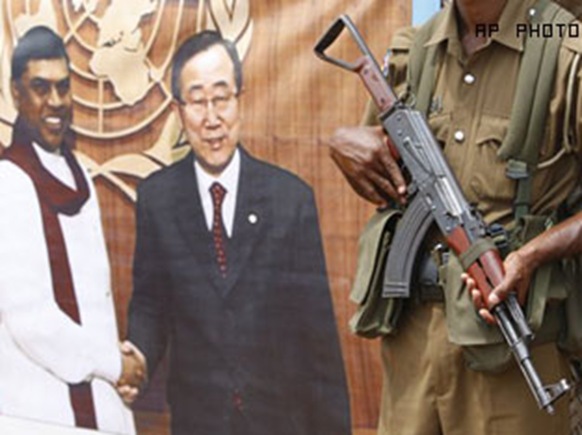When the UN Panel of Experts recommended to Secretary General Ban Ki-moon that he establish an investigative mechanism for war crimes in Sri Lanka, Ban responded that he’d only do so upon a vote of one of the UN’s three “inter-governmental bodies.”
Ban’s claimed powerlessness, however, was called into question this week on the margin of the Human Rights Council vote in the General Assembly.
It was pointed out that when for example the UN did an investigation of abuses in the Democratic Republic of the Congo, the so-called Mapping Report with much information about Rwanda, it had not waited for any vote by the HRC, GA or Security Council.
Ban, it was said by contrasted, wants to say he can or will only act on tens of thousands of civilians’ deaths if one of the three bodies makes him. “Some leadership,” a expert in UN legal practice based in Geneva told Inner City Press.
At the UN’s May 20 noon briefing, Inner City Press asked Ban’s spokesman Martin Nesirky to respond to this criticism, as well as to a published report in Sri Lanka that Ban has already negotiated away the Panel of Experts’ recommendations in a closed door meeting with Sri Lankan Permanent Representative Palitha Kohona.
Nesirky tried to limit the questioning by insisting “last question,” then saying he would revert with information about the mapping report, which had not happened more than five hours later.

Ban portrayed in Sri Lanka with Basil Rajapaksa & gun
From the UN’s May 20 transcript:
Spokesperson Martin Nesirky: Matthew, last question.
Inner City Press: Well, I don’t know, I have a couple.
Spokesperson Nesirky: Well, a last question; you can choose.
Inner City Press: well… There is an article in the Sri Lankan press that reports, and maybe you will just deny this one, in which case, I hope to have, to ask you about a protest that was held outside yesterday. But there is an article in the Sri Lankan press saying that the Secretary-General, Ban Ki-moon, and Permanent Representative Palitha Kohona, have substantively discussed the Panel of Experts report and the forthcoming, now delayed, LLRC [Lessons Learned and Reconciliation Commission], and have come to an agreement; that there is some agreement reached, which recommendations would be implemented by Sri Lanka, which ones would not be, and that essentially the matter is finished. I can, I mean, the article, it is in [inaudible]; and I wonder whether the UN, given that it’s apparently, its’ summarizing a meeting between the two, is this accurate or not accurate?
Spokesperson Nesirky: Well, as you know, we’ve been very clear; the report has been published in its entirety. You can see the recommendations that there are there, and the Secretary-General stands by the report that’s been prepared for him by the Panel of Experts. That’s the first point. The second is that we have repeatedly said in the run-up to the report being published, and after the report was published, that the Government of Sri Lanka is welcome to provide its response, its official response, to the report. And we would welcome that. We haven’t seen it yet.
Inner City Press: This is related to that. Yesterday, in connection with this Human Rights Council vote today, it was said that the Secretary-General does have the power to begin his own investigative mechanism of a sort, and that this was the UN system’s — the report they did on Rwanda, the mapping report — that this was a report that was done by the UN system without authorization by any intergovernmental body. Is that accurate?
Spokesperson Nesirky: Well, as you know, we’ve been quite clear on that. Firstly, accountability is for the national authority in any given case. And in this case, it is no different: accountability is for the Sri Lankan authorities. We’ve also said that, in this report on accountability that was given to the Secretary-General, it sets out that the Sri Lankan authorities should indeed be doing this. It also says that — and the Secretary-General said this in his statement with the report — that there needs to be, to take it forward, there needs to be either consent from the national Government, the national authorities — in other words the Sri Lankan authorities — or there needs to be a mandate from an intergovernmental body; and you know what they might be. And that’s the position.
Inner City Press: So the mapping report, which intergovernmental body authorized it?
Spokesperson Nesirky: I can give you the details on that later.
But five hours later and counting, no information had been provided.
(For updates you can share with your friends, follow TNN on Facebook and Twitter )
